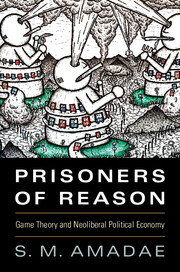8 - Consent
from PART II - GOVERNMENT
Published online by Cambridge University Press: 18 December 2015
Summary
Ultimately what sets apart the classical liberal and [law and] economic conceptions of rights and liability rules is the case in which liability rules are thought sufficient to justify a transfer…. For it can never be any part of the classical liberal account that by compensating someone for taking what is his without his consent, an injurer respects the victim's rights; whereas the core of [rational choice] economic analysis is the possibility that by compensating a victim, an injurer (at least sometimes) gives his victim all that he is entitled to, thereby legitimating the taking.
Jules Coleman, 1988Richard Posner's law and economics, on examination, is even more distributionally biased in favor of wealthier individuals than Buchanan's minimal constitutionalism. Buchanan's use of the unanimity principle to capture the importance of voluntary consent is at least designed in principle to enable individuals to veto conditions that would erode their current status, even if it fails to live up to this promise given the inevitability of coercive bargaining and de facto possession. Posner's law and economics, on the other hand, overtly privileges wealthy individuals by asserting that resources should be in the hands of those who value them most, as measured by agents’ willingness and ability to pay for them. In effect, Posner's scheme puts resources up for auction to the highest bidder. Rights themselves are subject to dispersion based on considerations of power. The concept of consent that Posner uses to ground his law and economics method is attenuated at least to the extent of Buchanan's unanimous agreement, if not more so.
Posner is one of the most prolific living public intellectuals in the United States, having published at least forty books, and is also a presiding judge on the US Court of Appeals for the 7th Circuit. The legal program he tirelessly promotes can be summarized by the mantra “justice is wealth maximization.” According to the law and economics school, the role of law is to ensure that resources are granted to those who can best use them, with use evaluated in terms of the ability to generate wealth. According to Posner, law only has the positive function of enforcing rules. It does not reflect privileged moral values. It is not inherently normative.
- Type
- Chapter
- Information
- Prisoners of ReasonGame Theory and Neoliberal Political Economy, pp. 205 - 223Publisher: Cambridge University PressPrint publication year: 2016



